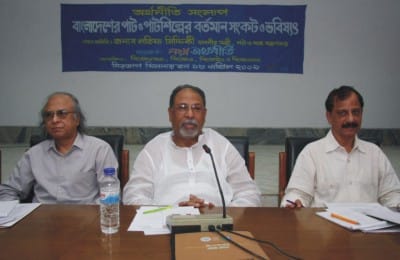Jute millers seek protection

Textiles and Jute Minister Abdul Latif Siddiqui, middle, speaks at a discussion on the "problems of the jute sector and its future" in Dhaka yesterday. Photo: STAR
Jute millers yesterday urged the government to make rules to ensure compulsory use of jute sacks and bags in the packaging of public and private sector industrial commodities such as cereals, fertiliser, sugar and cement.
“Too much dependence on the global market makes us vulnerable to tough competition. Unless the domestic market for jute expands, it will be difficult to see notable progress in the industry,” said Md Ahmed Hossain, chairman of Bangladesh Jute Spinners Association.
Citing a compulsory packaging law framed by the Indian government, Hossain said a similar step was needed to increase demand for jute goods in the local market.
“It will also protect the environment from the use of synthetic or poly-bags,” he said.
Hossain made the plea at a discussion on the "problems of the jute sector and its future" at the CIRDAP auditorium, organised by an upcoming magazine, Naya Arthanity, with the support of four associations tied to jute.
Textiles and Jute Minister Abdul Latif Siddiqui spoke on the occasion where representatives from both public and private sector blamed the successive governments' negligence to the country's once golden fibre industry.
Siddiqui said the dire condition of the jute sector is due mainly to an agreement signed in 1992 between the World Bank and the then Bangladesh government.
“But we want to make it clear that all the jute mills will run,” he said. “We are trying to resume operations of the state-run jute mills.”
Discussants pointed to the scarcity of high-yielding seeds, delayed disbursement of funds to state-owned jute mills to buy jute from farmers, lack of investment in technology upgrading and human resources development behind the poor performance of the industry.
They complained of not getting loans at a 7 percent interest rate. Citing a previous Bangladesh Bank directive to banks, millers said banks do not sanction loans at a low interest rate although jute and jute goods fall under the agro-based industry category.
Hossain said: “We need easy loans from banks and increased subsidy from the government to fight the setbacks of global recession."
The global economic meltdown has already hurt exports of raw jute and jute goods with many jute mills either shutting or drastically cutting production. Thousands of workers face the threat of joblessness, owners said.
“Even if we are an agro-based industry, we are not getting the benefit of it. We are supposed to benefit from the subsidy offered by the government to exports of farm products,” said TD Mitra, chairman of Bangladesh Jute Mills Corporation (BJMC).
Mitra recommended speedy disbursement of funds to buy jute, investment in technology upgrading and human resources development to revive the jute sector.
“The jute industry will not vanish if you make proper arrangements for us to run smoothly,” he said.
Siddiqui said the government would take both short- and long-term measures to exploit the enormous prospects of the jute industry.
“The world now shows interests in jute instead of synthetic bag. We have taken an initiative to form a jute commission to strengthen the sector,” he said.
The minister also assured that he would forward the demands of jute millers to Prime Minister Sheikh Hasina and Finance Minister AMA Muhith.

 For all latest news, follow The Daily Star's Google News channel.
For all latest news, follow The Daily Star's Google News channel. 



Comments